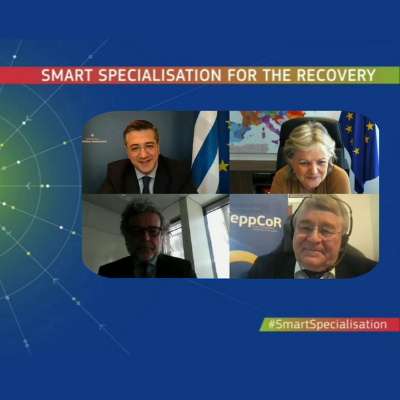The European Commission's Joint Research Centre (JRC) and the European Committee of the Regions (CoR) jointly organised on the 15th of April the online workshop on Smart Specialisation for the Recovery. It was opened by European Commissioner for Cohesion and Reforms, Elisa Ferreira, and by the President of the European Committee of the Regions, Apostolos Tzitzikostas. The event featured key speakers including the former director of EURADA, Christian Saublens.
Smart Specialisation Strategies (S3) is crucial methodology for the EU Cohesion Policy, along which regions and countries develop and implement their R&I strategies. It is a place-based EU policy approach focused on the identification of the strengths and assets of each region and on an Entrepreneurial Discovery Process with wide stakeholder involvement. Elisa Ferreira, Commissioner for Cohesion and Reforms, identified the close link between growth and acceleration with R&I and the different funding tools already in place. EU regional development, cohesion policy and smart specialisation are key tools to address regional constraints and innovation challenges in Europe. She also underlined the need to "build back better" to avoid a "K-shaped" recovery, where some regions recover quickly and others risk stagnating or falling behind. "Over the 2014-2020 programming period, more than €65 billion of cohesion policy funds were invested in R&I. While the new programmes are still in preparation, it is likely that at least half of new cohesion policy investment will target smart and green projects. Innovation is place-based and smart specialisation strategies help regions build their capacities around their assets. We are aiming to further strengthen links between our investments and smart specialisation strategies, to improve synergies with Horizon Europe and to simplify procedures", European Commissioner Ferreira stated.
In the same line, Carlos Ferreira De Morais Pires, on behalf of European Commissioner for Innovation, Research, Culture, Education and Youth, Mariya Gabriel, stated that "smart specialisation will continue playing a major role in supporting research and innovation to ensure the sustainable and resilient development of all regions in Europe over the next programming period 2021-2027. In the light of the challenges posed by the Covid-19 pandemic, this helps to consolidate a sustainable, smart and inclusive Europe".
Apostolos Tzitzikostas, President of the European Committee of the Regions, highlighted that "overcoming the crisis triggered by the pandemic requires unprecedented cooperation and innovation capacities. Building efficient partnerships to deliver inclusive innovation processes is the essence of Smart Specialisation. This is why in the current scenario, Smart Specialisation is not a luxury or a best practice, but a powerful method to mobilise available investment". Bernard Magenhann, Deputy Director General of the European Commission’s Joint Research Centre, presented the concept of S4 – Smart Specialisation Strategy for Sustainability and Inclusiveness – "an innovation-driven policy for competitive sustainability leaving no place and no one behind. It builds on the Smart Specialisation approach that we have developed over the past years, adapting it to the new context." Governance can improve result-oriented strategies, hence Mr Chrisitian Saublens, former director of EURADA, and Mr Mathieu Doussineau, JRC, presented a strengthened evidence-based approach for more result-oriented S3 strategies.
Mr Christian Saublens, former director of EURADA who was presented at the event as the “most experienced person in the frontline of economic development”, explained how this methodology is embedded inside the new policy cycle. The methodology aims to translate the regional visions into practical, targeted and specific inputs and outputs: “It is an invitation for policy-makers and stakeholders to undertake a journey which starts with a fair self-assessment of the ecosystem, including, in the field of management capacity, to adopt realistic means to address the policy objectives, end users and market expectations”. The full methodology is expounded in their report.
